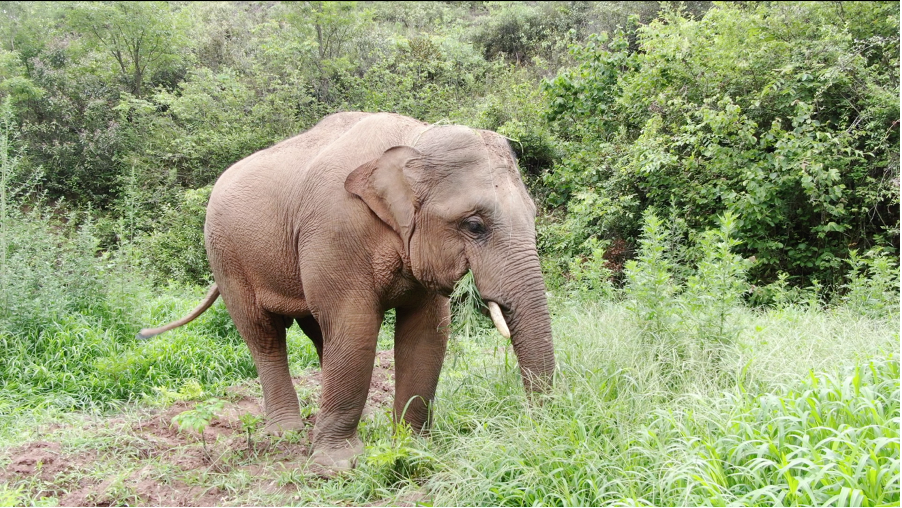A herd of wild elephants, which started an unusual northbound journey, deviating from their traditional migratory route, since last year in southwest China's Yunnan Province, is showing signs of returning to their natural habitat.
Surveillance footages show that the herd of 14 is moving southward during the past few days. Tuskers have traveled around 10 kilometers in Eshan County of Yuxi City from Friday afternoon to Saturday afternoon, according to the monitoring center, set up to observe the movement of elephants.
On Thursday, they traveled through four villages, covering 23 kilometers southbound in the county.
In March last year, the herd embarked on an epic journey from their natural habitat in Xishuangbanna, the southernmost prefecture of southwest China's Yunnan Province.
They've trekked more than 300 miles, passing through the cities of Pu'er, Honghe and Yuxi, reaching the outskirts of provincial capital Kunming in early June, a city of more than 8 million residents.
On June 3, the herd decided to retreat back to neighboring Yuxi City and began to linger around in the same area.

The herd of wild Asian elephants roams in a wooded area of Eshan County, Yuxi City. /Courtesy of Yunnan Provincial Forestry Firefighting Brigade
The herd of wild Asian elephants roams in a wooded area of Eshan County, Yuxi City. /Courtesy of Yunnan Provincial Forestry Firefighting Brigade
Shen Qingzhong, a senior engineer from the Scientific Research Institute of the Xishuangbanna National Nature Reserve, told CGTN that it means that the elephants have realized it's unwise to continue to march forward.
According to his observation, Shen said that during the long migration, the herd has tried to shun the crowds and stayed in wooded areas most of the time, as they were probably afraid of getting hurt by people, especially to the two cubs.
He said that elephant is a kind of species with thinking ability, they know how to make a choice beneficial to them, and that a metropolis like Kunming is definitely not a good choice.
Another important factor is food. If they keep traveling towards the north, food availability will become a severe challenge to them.

The male elephant that broke away from the herd forages in a wooded area of Jinning District, Kunming City. /Courtesy of Yunnan Provincial Forestry Firefighting Brigade
The male elephant that broke away from the herd forages in a wooded area of Jinning District, Kunming City. /Courtesy of Yunnan Provincial Forestry Firefighting Brigade
Meanwhile, the male elephant that broke away from the herd of 15 individuals still stranded in Kunming and is getting further away from his family. On Saturday, they are some 53 kilometers apart.
It's natural for an adult male elephant to separate from their group to seek mates for breeding, Shen said. The behavior is like one of like 13-year old, just like "a teenage boy in a rebellious phase," Shen added.
In fact, earlier this month, the herd kept roaming in Yimen County for some 10 days, which was regarded as a signal of waiting for the separated one. Shen said it's likely that they would have dropped him and restart their new journey.
'His lingering has inevitably brought great risks to nearby residents as well as much pressure to local authorities," Shen said.

Monitors use drones to keep track of the elephants. /Courtesy of Yunnan Provincial Forestry Firefighting Brigade
Monitors use drones to keep track of the elephants. /Courtesy of Yunnan Provincial Forestry Firefighting Brigade
Researchers pointed out that it will take some time before the herd can go back to their original habitat, as they are expected to encounter multiple challenges on their way back.
Shen said that the giant neighbors would unavoidably attract curious people along the way, which will be a disturbance to them.
Chen Mingyong, a professor on Asian elephant studies from Yunnan University, told CGTN that the greater test for them is from the nature, as they'll have to trample over natural barriers, such as the Honghe River and even mountain ranges, resulting in obstruction.
Shen echoed him, explaining that the flooding season would make it difficult for them to cross rivers, especially for the baby elephants.
To ensure the safety of both the pachyderms and local residents, authorities continue to beef up related measures, closely monitoring the herd's movement while trying to prevent them intruding into populated areas.
Food on the animals' favorites list is still provided on a daily basis.
(Cover image provided by Yunnan Provincial Forestry Firefighting Brigade.)
(If you want to contribute and have specific expertise, please contact us at nature@cgtn.com.)

